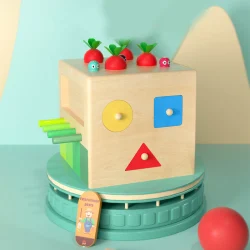Considerations for Choosing Educational Toys
2024-06-15
Educational toys play a crucial role in child development by promoting cognitive skills, creativity, problem-solving abilities, and social interaction. These toys are designed to stimulate learning through play, making educational concepts engaging and enjoyable for children. Here are some categories of educational toys along with examples:
1. Building and Construction Toys:
- LEGO and Duplo: These building blocks encourage spatial awareness, fine motor skills, and creativity as children construct various structures.
- Magnetic Building Tiles: Sets like Magna-Tiles or Magformers promote STEM learning by exploring magnetic principles and geometric shapes.
2. Puzzles and Brain Teasers:
- Wooden Puzzles: Jigsaw puzzles of varying complexity help develop problem-solving skills, shape recognition, and patience.
- Rubik's Cube: Enhances spatial reasoning, critical thinking, and perseverance as children solve the puzzle to align colors.
3. STEM Toys (Science, Technology, Engineering, Mathematics):
- Robotics Kits: Kits like LEGO Mindstorms or Dash and Dot robots teach programming basics, problem-solving, and logical thinking.
- Science Kits: Kits that include experiments in chemistry, physics, or biology, fostering curiosity and scientific exploration.
4. Art and Creativity:
- Drawing and Painting Supplies: Encourage creativity, fine motor skills, and self-expression through mediums like crayons, markers, and paints.
- Craft Kits: Kits for making jewelry, pottery, or model building that promote creativity, following instructions, and spatial awareness.
5. Language and Literacy:
- Books and Storytelling Sets: Interactive books, audio books, and storytelling sets that develop language skills, vocabulary, and comprehension.
- Alphabet and Phonics Toys: Toys that teach letters, phonics sounds, and early reading skills through interactive play.
6. Social and Emotional Development:
- Dress-Up Clothes and Role-Playing Sets: Encourage imaginative play, empathy, and understanding of social roles and relationships.
- Board Games: Games that require turn-taking, cooperation, and strategic thinking while reinforcing math, language, and social skills.
7. Music and Movement:
- Musical Instruments: Instruments like xylophones, drums, or keyboards that promote rhythm, coordination, and auditory skills.
- Outdoor Toys: Bikes, scooters, or sports equipment that encourage physical activity, gross motor skills, and social interaction.
Considerations for Choosing Educational Toys:
- Age Appropriateness: Select toys that match the child's age and developmental stage to ensure safety and engagement.
- Learning Objectives: Choose toys that align with specific learning goals such as literacy, STEM concepts, creativity, or social skills.
- Quality and Durability: Look for toys made from safe materials that can withstand play and exploration over time.
- Open-Ended Play: Toys that allow for open-ended play and creativity enable children to explore and discover at their own pace.
Educational toys not only facilitate learning but also encourage curiosity, exploration, and a love for learning from a young age. They can be used effectively in homes, schools, and daycare settings to support holistic child development.



